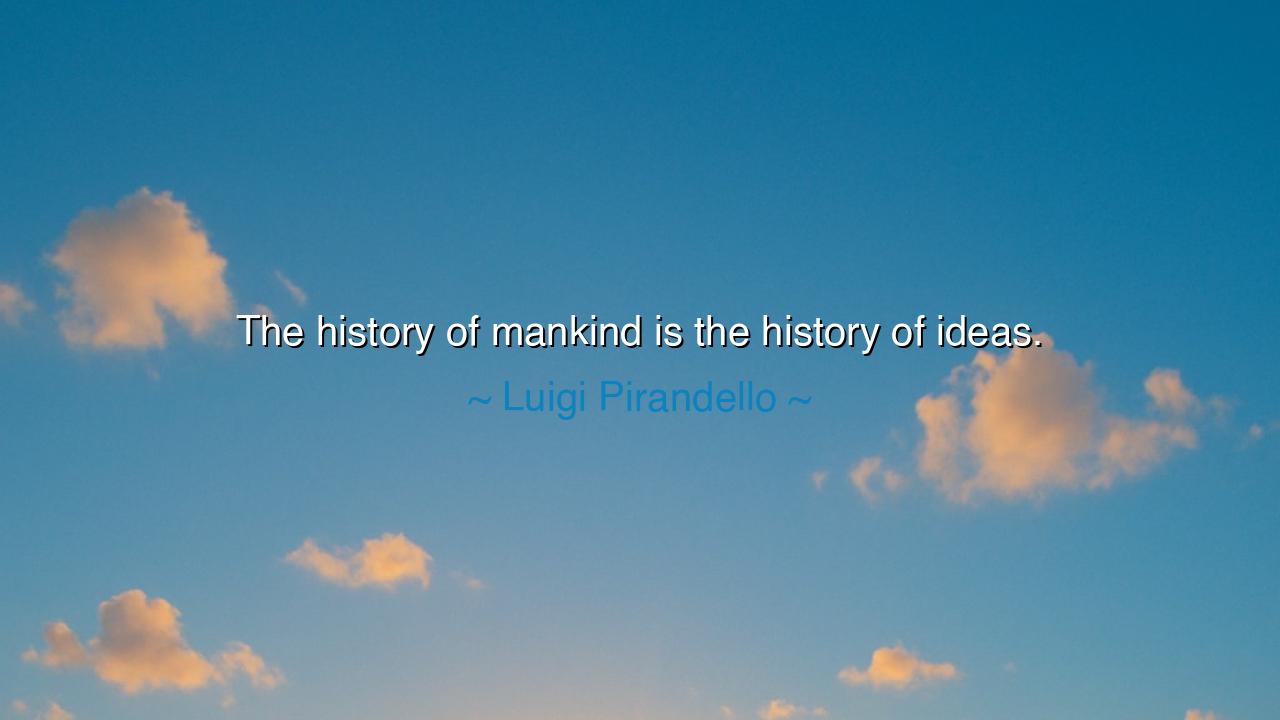
The history of mankind is the history of ideas.






“The history of mankind is the history of ideas.” — Luigi Pirandello
When Luigi Pirandello, the great Italian playwright and philosopher, uttered these immortal words, he sought to unveil a truth deeper than empires, armies, or kings. For though the world remembers the clash of swords and the rise and fall of nations, it is not iron or blood that endures—it is the idea. Behind every battle, behind every triumph and every ruin, stands a thought — invisible, yet immortal — guiding human destiny like a divine wind. Thus, Pirandello reminds us that to understand the journey of humanity, we must look not to its monuments of stone, but to the ideas that shaped the hearts of those who built them.
From the dawn of time, the story of man has been a dialogue between thought and being — between what is, and what might be. The first spark that lit the cave of the primitive hunter was not fire, but the idea of fire — the dream that light could be born from stone. The first law was not carved into tablets, but conceived in the mind that sought justice. The wheel, the temple, the republic — all were children of ideas, brought forth from the womb of imagination. Empires crumble, but a thought endures beyond the dust of centuries, reborn in new minds, speaking new tongues. Indeed, ideas are the true immortals, wandering through time clothed in the forms of each age.
Consider the idea of freedom, for instance — an idea older than history itself. It stirred in the hearts of the Greek philosophers, who dared to claim that men were not born as slaves to kings. It found new voice in the Roman tribunes, who carved the Republic from tyranny. Centuries later, it crossed oceans and kindled the American Revolution, then swept through Europe in cries of liberty. The armies that marched under its banner have vanished; the flags they carried are tattered relics. Yet freedom, as an idea, lives still — reshaped, reimagined, reawakened — for ideas cannot die; they only sleep until the next dreamer calls them forth.
Pirandello, a man of thought and theatre, understood this well. Living in an age torn by war and the crumbling of old certainties, he saw that nations perish, but ideas transform. He watched as the 20th century shattered illusions of progress, yet he also saw new visions rise — of psychology, of identity, of truth itself. He knew that human history is not a straight path, but a spiral, ever turning upon itself, guided by the evolution of mind. Each generation inherits not the riches of its ancestors, but their ideas — and from these, it fashions its own destiny.
Yet Pirandello’s wisdom carries also a warning. For if ideas are the lifeblood of mankind, they can also be its poison. The same thought that liberates can enslave when corrupted by pride or fear. The idea of faith can uplift or divide; the idea of nation can unite or destroy. History bears witness: from the vision of Christ came compassion, but also crusades; from the dream of equality came revolution, but also terror. Thus, man must be ever watchful, for the idea is a sword of two edges — it can build worlds, or burn them. To wield it is to wield creation itself.
The lesson is this: guard your mind, for it is the cradle of eternity. The thoughts you nourish today will shape the world tomorrow. Do not scorn the power of an idea, for every great movement, every act of justice, every work of beauty began as a whisper in the mind of one who dared to think differently. Nurture your thoughts as seeds of light — question them, refine them, set them free. Let them be guided not by pride or anger, but by truth and compassion.
So remember, as Pirandello taught, that history is not written only by conquerors, but by thinkers — by those who dream what others cannot yet see. The true monuments of mankind are not carved in marble, but in meaning. To live with thought is to participate in eternity; to act upon noble ideas is to become part of the story of creation itself. For when your body fades and your name is forgotten, it is your ideas — your sparks of vision and truth — that will carry your spirit onward, lighting the path for those who come after.






AAdministratorAdministrator
Welcome, honored guests. Please leave a comment, we will respond soon